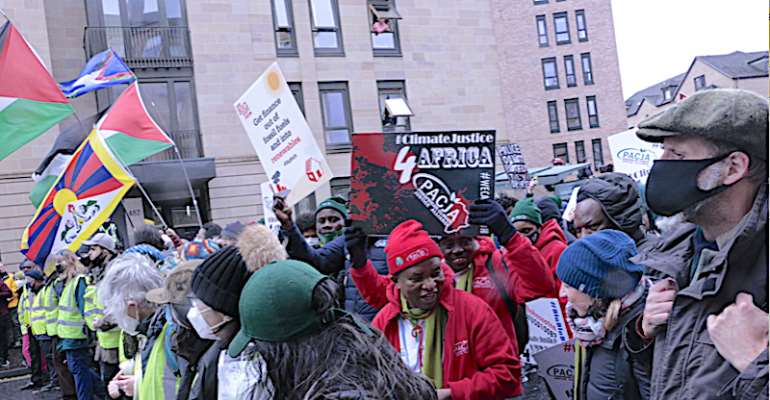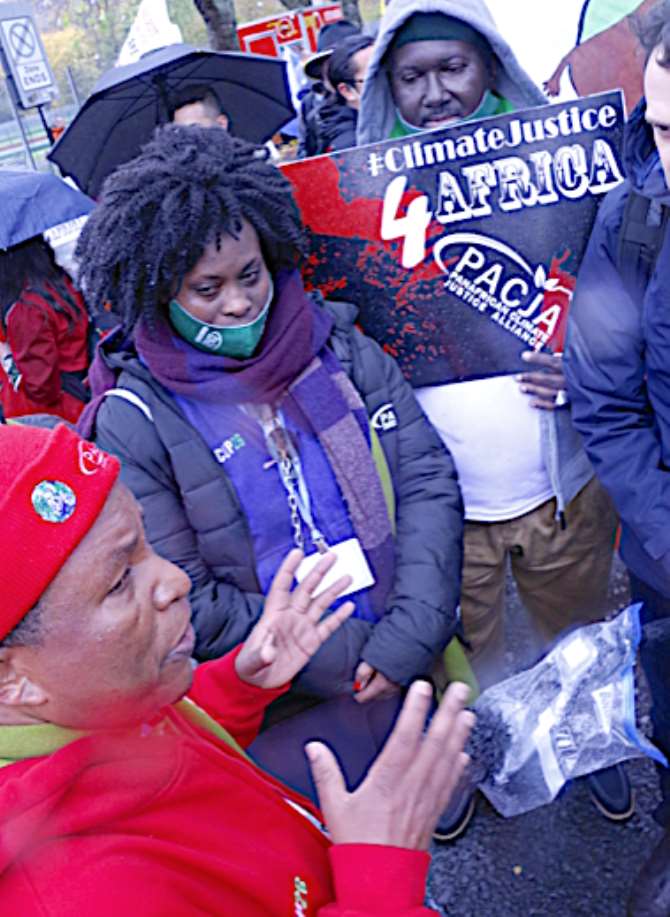Glasgow Climate Pact: Unambitious and Bad for Africa
Statement by the Pan-African Climate Justice Alliance on decisions taken at COP26

Nairobi (Kenya), 19 November 2021:The Pan-African Climate Justice Alliance has reviewed the Glasgow Climate Pact, emanating from the 26th Conference of Parties (COP26) of the UN Framework Convention on Climate Change (UNFCCC), which ended on 12 November 2021. Having considered the breadth of debates, pledges and decisions, PACJA would like to state the following:
COP26 was an opportunity to spur ambitious action and secure protection for hundreds of millions of people affected by climate change in Africa and other developing nations. The results of the discussions and negotiations are, however, sobering. Efforts to secure a healthy planet and resilient communities were derailed by the narrow interests of states, especially those who are expected to do more to address the climate crisis because of their past and current share of greenhouse gas emissions.
COP26 exposed a world leadership that lacks the collective will to act decisively to prevent an imminent collapse of the global climate system. The decisions made at Glasgow have deepened the disturbing concerns over lack of global solidarity to deal with the suffering of people unjustly burdened by climate change. Without significant change of course as we head to COP27, a climate calamity is inevitable, and in light of recent scientific discoveries, that could happen earlier than previously feared.
Mr Mithika Mwenda (in red jumper) joins the Global March for Climate Justice held on November 6 during the 26th Conference of Parties to the UN Framework Convention on Climate Change (COP26). Here he gives an interview with Scotland-based TV reporters.
Here is why PACJA believes the Summit failed:
- COP26 focused on accommodating and comforting big polluters. While some progress has been made to curb and eventually reverse deforestation, the United States, China and India successfully weakened the ambition to phase out coal and eliminate public subsidies to fossils fuels, which is badly needed to limit the global temperature increase to 1.5ºC above pre-industrial levels.
By introducing phrases like “phase down” and “inefficient fuel subsidies”, the Glasgow Climate Pact kept the window open for the fluid interpretation of nations’ obligations to cut emissions from the energy sector, which alone accounts for two-thirds of total emissions. COP26 produced half-measures and adopted false solutions by (mis)directing critical mitigation centres of actions from fossil fuels to forests and agriculture. Combined, emission reduction pledges made at COP26 will only reduce emissions by 18% by 2030. We need at least 45%. The Glasgow Pact was not forceful enough in demanding finalisation of the remaining NDCs ahead of COP 27.
- Glasgow, once again, ignored the profound needs and demands of Africa and other developing countries. Despite acknowledging the urgency of the need to protect people and communities and recognizing the current adaptation gap with “serious concern”, the Parties’ decisions failed to achieve the goals of the Paris Agreement. The European Commission announced a 100-million-Euro contribution to the Adaptation Fund. But, as acknowledged in the Glasgow Pact, Adaptation finance is insufficient. The estimated adaptation cost in Africa is around USD 45-50 billion a year by 2050 and USD 350 billion a year by 2070.
A challenge that remains unresolved is matching adaptation finance, crucially needed in Africa, to mitigation. There is strong evidence that Africa suffers more than other continents from the impacts of climate change – communities are highly vulnerable as they are exposed to greater climate stresses and have weak capacity to cope with the climate change effects. The Parties again, did not discuss Africa’s special needs and circumstances.
Equally disturbing, COP26 provided no clear targets for raising finance for loss and damage. Although Article 6 rulebook was updated, there is no clarity on how markets can be harnessed to drive emission reduction. Discussions and decisions on Article 6 continued to focus on its market components (beneficial to reach country) and failed to reflect the full breadth and spirit of the Article.
- Rich countries remain reluctant to make the financial contributions to drive adaptation, resilience building and mitigation in poor countries.The Glasgow Pact contained the ineffective language of ‘urging’ rich countries to increase climate finance. A new goal of “mobilising” USD100 billion annually in climate finance through 2035 is no call for celebration. The Glasgow Pact contains no guarantees that this financing target will be met. It demonstrates rich countries’ lack of commitment to substantially support developing countries to cope with climate change and contribute to mitigation. Without an increased and predictable flow of financial resources to the Global South, countries will be unable to fulfil the climate actions contained in their Nationally Determined Contributions (NDCs).
- MITHIKA MWENDA
EXECUTIVE DIRECTOR, PACJA

